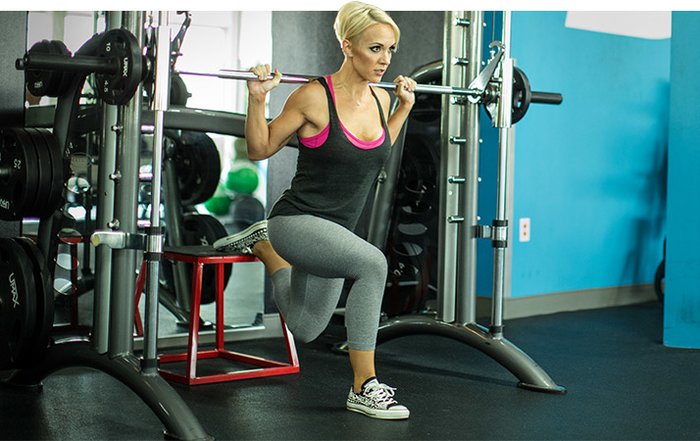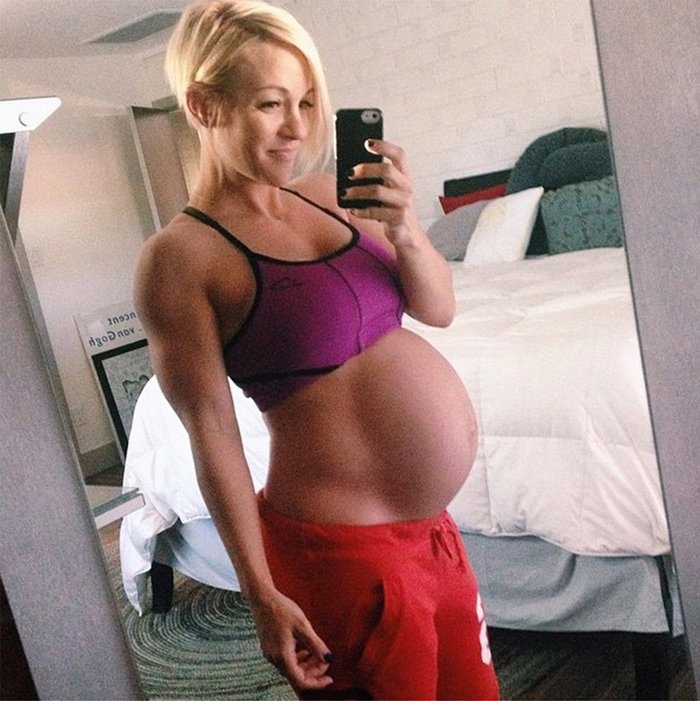If you're not sure where to start on your own quest to get fit before or during your pregnancy, follow these simple tips!
Don't Stop Exercising
Being fit before you get pregnant makes everything about your gestation period, labor, and postnatal life a lot more enjoyable. In fact, a study in the journal PLOS ONE found that women who are moderately healthy prepregnancy (based on a BMI value of 18.5-24 kg/m2) don't gain as much weight during pregnancy as their less-active counterparts.[1] Something as easy as a regular 20-minute stroll to the local park can make the road back to your old body much easier and faster.
I didn't try to set any personal bests or win any prizes during my pregnancy— I just kept doing what I was doing. If you don't have a high-risk pregnancy, there's no reason you should stop working out.

In fact, research done at the University of Alberta found that pregnant women who exercise may significantly lower their risk of a C-section and of giving birth to large babies.[2] Still, use your common sense and good judgment. If something doesn't feel right, stop doing it or make an adjustment. My weight on squats and deadlifts went down about 50 percent during my third trimester, but that didn't mean I stopped.
Take care of yourself, stretch every day, and consider adding yoga to your routine. I also integrated a massage every other week. If you find an experienced massage therapist, they'll know how to work with your growing belly.
Don't Fight Your Cravings
Pregnant or not, eating is all about moderation. I continued to track all of my food and macros during my pregnancy, just as I had before it. Having flexibility in my diet made it possible to make room for foods I craved.
Remember to allow yourself to enjoy your pregnancy, but don't use it as an excuse to put on sweatpants and eat whatever you want. You have a growing baby inside you, and you need to make sure you provide him or her with the best nutrients and enough water every day.
The food choices you make now could affect your child for life. Research in the journal Birth found that eating too much junk food while you're pregnant can lead to higher infant birth weight and possibly early childhood obesity.[3]
Cut Down On Meal-Prep Time
I believe that your attitude can make a huge difference during any stage of life. Even a paper in Obesity Research and Clinical Practice found that pregnant women who gained the right amount of weight during pregnancy stuck to a meal plan and chose foods carefully.[4] However, those who believed they were "eating for two" gained excessive amounts of weight.

Throughout my entire pregnancy, and especially afterward, I ordered plenty of B-Elite Fuel meals. I knew that, if I always had some in my freezer, they would be my go-to meals during pregnancy when I was having cravings or experiencing food aversions and couldn't think of anything to eat. I would heat my favorite B-Elite meal up, add some cheese or avocado, top with my favorite seasonings, and be set.
Post-pregnancy is when having these healthy, prepared meals helped most. I was suddenly a brand new mom with a newborn and my own business—there was no such thing as maternity leave. I also had to keep my calories high in order to keep my milk supply plentiful for breastfeeding, so staying well fed was more important than ever before.
Being so busy while learning all about motherhood made food prep nonexistent. I ordered enough B-Elite Fuel meals so that I could have one of them per day, in addition to my morning oatmeal and eggs, and a family dinner that my husband, Alex, would cook. These meals were one of the most important factors for me getting back into shape while keeping my milk supply up.
If you're considering B-Elite Fuel, but think it looks a little bland, add your favorite side or topping to the mix. Some of my favorites while pregnant were salsa, cheese, avocado, and lemon. The meals are great as-is, but if I wanted to get fancy, I'd dice them up, mix them in a bowl, and wrap everything up in a tortilla.
Supplement Smart
Pregnancy doesn't have to mean an end to supplementation, either. Throughout my pregnancy, the supplements I used were whey protein, amino acids, omega-3 fatty acids, CLA, and a multivitamin. I skipped the thermogenics and pre-workouts during pregnancy and breastfeeding.
I recommend you talk with your obstetrician before you start any new supplement regimen, but caffeine intake should definitely be limited during pregnancy due to its possible effect on fetal growth.[5]
References
- Li, N., Liu, E., Guo, J., Pan, L., Li, B., Wang, P., ... & Hu, G. (2013). Maternal prepregnancy body mass index and gestational weight gain on pregnancy outcomes. PLOS ONE 8(12).
- Wiebe, H. W., Boulé, N. G., Chari, R., & Davenport, M. H. (2015). The Effect of Supervised Prenatal Exercise on Fetal Growth: A Meta-analysis. Obstetrics & Gynecology, 125(5), 1185-1194.
- Wen, L. M., Simpson, J. M., Rissel, C., & Baur, L. A. (2013). Maternal "junk food" diet during pregnancy as a predictor of high birthweight: Findings from the healthy beginnings trial. Birth, 40(1), 46-51.
- Chuang, C. H., Stengel, M. R., Hwang, S. W., Velott, D., Kjerulff, K. H., & Kraschnewski, J. L. (2014). Behaviours of overweight and obese women during pregnancy who achieve and exceed recommended gestational weight gain. Obesity Research & Cinical Practice, 8(6), e577-e583.
- CARE Study Group. (2008). Maternal caffeine intake during pregnancy and risk of fetal growth restriction: a large prospective observational study. BMJ: British Medical Journal, 337(7682), 1334-1338.

